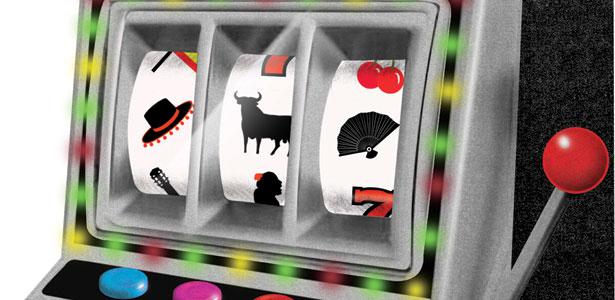 马德里是西班牙的心脏,但瓦尔德卡洛斯(ValdeCarros)的最南部地铁浅蓝线地铁站,感觉就是像世界末日。触目荒凉,空气中弥漫着臭鸡蛋的臭味。比起气味更来势汹汹是随处可见的趴在烂尾楼工地上起重机。
马德里是西班牙的心脏,但瓦尔德卡洛斯(ValdeCarros)的最南部地铁浅蓝线地铁站,感觉就是像世界末日。触目荒凉,空气中弥漫着臭鸡蛋的臭味。比起气味更来势汹汹是随处可见的趴在烂尾楼工地上起重机。
成千上万的这些房子,以及配套的商业社区,曾经是为瓦尔德卡洛斯规划的。现在,在西班牙连续四年的经济衰退之后,起重机被遗弃在那里一动不动。被遗弃的烂尾楼工地散落在整个国家的城市周边地带,严厉的紧缩措施--其中包括80亿美元合并预算的削减和增税,重创了西班牙经济。今年六月,面对暴跌的信贷评级和近25%的失业率,西班牙政府同意了欧联的银行救助。
然而,在那里,大多数观察家看到的是废墟,谢尔登•阿德尔森看到了机会。这位美国赌场大亨,在拉斯维加斯发迹,赚得他最初的数十亿美元,一直以来,在宾州,澳门,和新加坡扩大了他的赌博帝国。他曾经在纽特•吉宁命运多舛的总统竞选战役上下重注,(现在他又支持米特•罗姆尼Mitt Romney)。同时,阿德尔森在西班牙的麻烦中投资,去年宣布他计划,在西班牙投资赌博业,建立一个合资企业,目前预计耗资350亿美元,建成包括12个景区,9个剧场,6个赌场,3个高尔夫球场,体育场,他称之为“欧元维加斯”的大项目。
一个健康的旅游业和便利的地理位置早已使得西班牙成为欧洲的一个利润丰厚的门户。但阿德尔森,似乎很喜欢陷入麻烦的西班牙,而不是健康的西班牙。9月一个投资者会议上,他说,高失业率保证了政府支持他的项目,在纽约最近的一次行会上,阿尔德森在拉斯维加斯的金沙集团的总裁,开玩笑地说:“谢尔顿称之为欧元维加斯,但当我们去建立它的时候,欧元也许不会在那里流连。”
一年多来,阿德尔森公开评论是否把他的生意带到马德里或者巴塞罗那。这两个城市都渴望得到这个项目,并在这个将为这个古老国家注入了新活力的项目竞争中互相贬低对方。今年春天,西班牙报纸报道,两个城市都考虑提升对外籍劳工签证的限制和提供豁免赌博税和社会保障支出。埃斯佩兰萨•阿吉雷,马德里坚定的保守党地区主席,美国茶党的同情者,一直积极倡导瓦尔德卡洛斯和城市郊区另外一个地点作为欧元维加斯所在地。她甚至承诺,允许在赌场里面吸烟,从来没有想到,这是联邦法律禁止的做法。巴塞罗那政府,同时,抛出了它的文化地标,费兰•阿德里亚,EL Bulli美食殿堂的主厨,在阿德尔森一行巴塞罗那访问期间为他们亲自下厨,并已宣称他也支持该项目。巴萨官方已经建议参考标志建筑设计师安东尼高迪的风格,以为项目注入“加泰罗尼亚风味。”
不论哪个城市,和这个存在潜在缺陷的项目,面临的最大挑战是,怎么筹集到阿德尔森要求西班牙银行提供的数十亿欧元的资金。在交流中,他声称,欧元维加斯将创造超过25万个职位,这些数字可能还会更大,大于马德里60万失业人数,在加泰罗尼亚的数字会更高。哪怕朗诵自己的新教义“超越我们的方法去生活”的预算削减的保守派,也正在放低身段,以确保项目成功,如果没有什么额外的风险的话。
具有讽刺意味的是,这场赌局为失业的西班牙人所不齿,他们在星光灿烂、超凡脱俗的欧元维加斯前面畏缩不前。在初期阶段欧洲迪斯尼也被嘲笑过,但即使这样,这个美国的眼中钉从来没有像这个项目这样被称为“滋养城市的烂薯,”一家主流报纸OP-ED这样评价欧元维加斯。对于西班牙人早就熟悉像《赌场》这样的电影情节了,这个项目名称和黑手党,有组织犯罪,和卖淫联系起来。对于阿德尔森,许多人认为他是一个Pez Gordo(西班牙语),“大鱼”,一个通过肮脏手段做生意的小贩。“像他这样的人是西班牙的危机的根源所在,”在6月马德里市中心的集会上,一个欧元维加斯抗议者告诉我。
离开瓦尔德卡洛斯之后,我取道去阿尔克科恩(Alcorcón),马德里的另外一个竞争地点。街道空荡荡的暴露在下午的酷热中,路灯杆上张贴着“促进就业经济激活计划”的标志。图片上是一个普通的办公场景,从办公桌后面坐着一个面带笑容的女人。一个名叫劳尔的出租车司机,同意带我去另外一个推荐的工地,一个高速路边上的被太阳暴晒的地方。劳尔支持从旅游业中获益,但他担心他已经知道这部电影的结局。“施工队会雇用西班牙人?”他问道,“再一次,快钱、临时职位,缺乏长远的计划,我们从教训中学到了什么?”
他教给我一个西班牙俗语。Pan para hoy, hambre para mañana,“现在的面包是明天的饥饿。”“对于西班牙来说,”他说,“欧元维加斯和一个老烂赌局一样。”
Madrid is the landlocked heart of Spain. But Valdecarros—the southernmost stop on the light-blue subway line—feels like the end of the world. The view is desolate, and the smell foul; an aroma of rotten eggs wafts from a nearby dump. More menacing than the odor are the cranes, peering out over squat, half-built housing units in every direction.
Tens of thousands of these units, and whole retail communities along with them, were once planned for Valdecarros. Now, in Spain’s fourth year of recession, the cranes stand motionless. Abandoned construction sites are strewn across the country’s urban fringes, and draconian austerity measures—including $80 billion in combined budget cuts and tax hikes—have battered its economy. In June, faced with plummeting credit ratings and nearly 25 percent unemployment, the Spanish government agreed to a bank bailout from the European Union.
Yet where most observers see ruin, Sheldon Adelson sees opportunity. The American casino mogul, who made his early billions in Las Vegas and has since expanded his gambling empire to Pennsylvania, Macau, and Singapore, bet early and heavily on Newt Gingrich’s ill-fated presidential campaign (he’s since opened his war chest to Mitt Romney). Meanwhile, Adelson was also banking on Spain’s distress, announcing last year his plans to build a gambling development on Spanish soil, a venture now projected to cost $35 billion and to include 12 resorts, nine theaters, six casinos, three golf courses, and a stadium. He calls it “EuroVegas.”
A healthy tourism industry and accessible location had long made Spain a lucrative gateway into Europe. But Adelson, it seems, likes Spain even better in sickness than in health. He told an investors’ conference in September that high unemployment guaranteed government support for his project. At a recent industry event in New York, the president of Las Vegas Sands, Adelson’s company, joked: “Sheldon calls it EuroVegas, but maybe the euro won’t be around when we go to build it.”
For more than a year, Adelson publicly deliberated whether to take his business to Madrid or Barcelona. Both cities crave the project and have engaged in a debasing game of one-upsmanship that has reinvigorated their age-old national rivalry. This spring, Spanish newspapers reported that both were considering lifting restrictions on foreign workers’ visas and offering exemptions from gambling taxes and social-security payouts. Esperanza Aguirre, Madrid’s staunchly conservative regional president and a sympathizer of America’s Tea Party, has aggressively championed Valdecarros and another location on the city’s outskirts as EuroVegas sites. She’s even promised to allow smoking in casinos—never mind that federal law prohibits the practice. The Barcelona government, meanwhile, has trotted out its cultural trademarks. Ferran Adrià, head chef at the fallen gastronomic temple El Bulli, cooked for Adelson’s entourage during one of its Barcelona visits and has pledged his support for the project. And Barcelona officials have suggested riffing off the style of the iconic architect Antoni Gaudí to infuse the project with “Catalan flavor.”
The biggest challenge for either city, and a potential pitfall for the project, will be raising the billions of euros in capital that Adelson demands Spanish banks provide. In exchange, he claims, EuroVegas will create upwards of 250,000 jobs. These numbers are likely inflated, but more than 600,000 people are without work in greater Madrid, and the number in Catalonia is higher yet. So even as budget-slashing conservatives recite their new catechism of having “lived beyond our means,” they are falling over themselves to secure a project that epitomizes nothing if not excess and risk.
The irony of this gamble is not lost on underemployed Spaniards, who for all their desperation still wince at the star-spangled vulgarity of EuroVegas. Euro Disney was derided in its early days, but even that American eyesore was never called a “half-rotten tuber to nourish a city,” as one prominent newspaper op-ed has termed EuroVegas. For Spaniards weaned on movies like Casino, the project’s name conjures Mafioso strongmen, organized crime, and prostitution. As for Adelson himself, many see him as a pez gordo, or “big fish,” an influence-peddler who cuts backroom deals. “People like him are what the Spanish crisis was all about,” one EuroVegas protester told me in June, at a rally in downtown Madrid.
After leaving Valdecarros, I make my way to the town of Alcorcón, home to Madrid’s other contending site. The streets are empty in the afternoon heat, and lampposts display signs announcing an “Economic Activation Plan for Employment.” They picture a generic office scene, with a woman smiling from behind a desk. A cab driver named Raúl agrees to take me to the proposed construction site, a nondescript blur of sunburned fields off the highway. Raúl stands to gain from a bump in tourism, but he suspects he knows how this movie ends. “Will Spaniards work on construction crews?” he asks. “Once again, quick money and temporary jobs, without a long-term plan. Have we learned anything?”
He teaches me a Spanish proverb. Pan para hoy, hambre para mañana—“Bread for now, hunger tomorrow.” “For Spain,” he says, “EuroVegas is the same old rotten bet.”
 马德里是西班牙的心脏,但瓦尔德卡洛斯(ValdeCarros)的最南部地铁浅蓝线地铁站,感觉就是像世界末日。触目荒凉,空气中弥漫着臭鸡蛋的臭味。比起气味更来势汹汹是随处可见的趴在烂尾楼工地上起重机。
马德里是西班牙的心脏,但瓦尔德卡洛斯(ValdeCarros)的最南部地铁浅蓝线地铁站,感觉就是像世界末日。触目荒凉,空气中弥漫着臭鸡蛋的臭味。比起气味更来势汹汹是随处可见的趴在烂尾楼工地上起重机。
